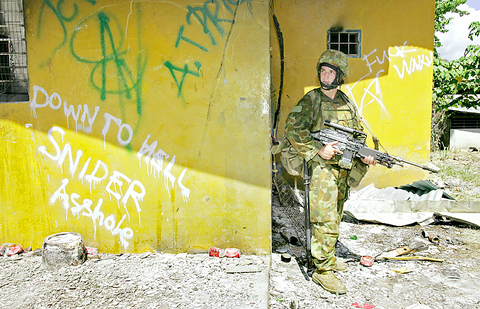Australian Foreign Minister Alexander Downer toured the riot-battered capital of the Solomon Islands yesterday as police warned of more violence in the impoverished South Pacific archipelago.
"It's devastating to see what happened," Downer said as he walked among heavily-armed police and soldiers in the once bustling Chinatown area of Honiara that has been reduced to a stretch of burned out ruins.
Downer then held a meeting with Snyder Rini, whose election as the new prime minister on Tuesday sparked the worst outbreak of violence since the 2003 arrival of the Australian-led Regional Assistance Mission to Solomon Islands (RAMSI) to end years of civil strife.

PHOTO: AFP
Angry protesters demanded Rini stand down due to his alleged association with widespread corruption during years of civil unrest before 2003.
Downer described the scenes of looted and burned out buildings as "tragic" and told Rini that economic reform was vital for the country to progress.
"I've made it clear to him that we are prepared to support democratic processes in Solomon Islands, and through what we've done we're also strongly in support of economic reform," Downer told reporters after the meeting.
"That economic reform is going to be central to the survival of the country; that continuing with an economic reform program is a life or death issue for Solomon Islands," he said.
Downer said he also addressed the issue of corruption with Rini.
"There has been a public perception of corruption for many years here in the Solomon Islands and the public perception of corruption has been matched by reality," he said.
The streets of Honiara were calm for a second day yesterday following an injection of police and military reinforcements from Australia, New Zealand and Fiji, as well as a ban on alcohol and a dusk-to-dawn curfew.
There were eight arrests overnight on Friday, including a man accused of throwing the first rock at Rini's car when the violence erupted.
As life slowly returned to normal, police were preparing for the next potential flash point when parliament sits on Monday for the first time since Tuesday's ballot for prime minister.
Solomon Islands police commissioner Shane Castles said extra troops had been brought in because of the possibility of renewed violence.
"Obviously it has to be [possible there is more violence], given what we faced earlier in the week," he said.
Rini has insisted he will not step down despite a pledge by opposition politician to launch a motion of no confidence in his leadership when parliament meets.
Many Solomon Islanders, who were pleased Downer was taking a first-hand look at the destruction, feared for what would happen when he left.
"It's good for him to be able to talk with some knowledge of exactly how it is," a man, who did not wish to be identified, said.
"Things are quiet now, but what will happen next after the vote of no confidence in parliament, I don't know. There are many rumors still around and it is still quite scary."

Indonesia was to sign an agreement to repatriate two British nationals, including a grandmother languishing on death row for drug-related crimes, an Indonesian government source said yesterday. “The practical arrangement will be signed today. The transfer will be done immediately after the technical side of the transfer is agreed,” the source said, identifying Lindsay Sandiford and 35-year-old Shahab Shahabadi as the people being transferred. Sandiford, a grandmother, was sentenced to death on the island of Bali in 2013 after she was convicted of trafficking drugs. Customs officers found cocaine worth an estimated US$2.14 million hidden in a false bottom in Sandiford’s suitcase when

CAUSE UNKNOWN: Weather and runway conditions were suitable for flight operations at the time of the accident, and no distress signal was sent, authorities said A cargo aircraft skidded off the runway into the sea at Hong Kong International Airport early yesterday, killing two ground crew in a patrol car, in one of the worst accidents in the airport’s 27-year history. The incident occurred at about 3:50am, when the plane is suspected to have lost control upon landing, veering off the runway and crashing through a fence, the Airport Authority Hong Kong said. The jet hit a security patrol car on the perimeter road outside the runway zone, which then fell into the water, it said in a statement. The four crew members on the plane, which

Japan’s ruling Liberal Democratic Party (LDP) and its junior partner yesterday signed a coalition deal, paving the way for Sanae Takaichi to become the nation’s first female prime minister. The 11th-hour agreement with the Japan Innovation Party (JIP) came just a day before the lower house was due to vote on Takaichi’s appointment as the fifth prime minister in as many years. If she wins, she will take office the same day. “I’m very much looking forward to working with you on efforts to make Japan’s economy stronger, and to reshape Japan as a country that can be responsible for future generations,”

SEVEN-MINUTE HEIST: The masked thieves stole nine pieces of 19th-century jewelry, including a crown, which they dropped and damaged as they made their escape The hunt was on yesterday for the band of thieves who stole eight priceless royal pieces of jewelry from the Louvre Museum in the heart of Paris in broad daylight. Officials said a team of 60 investigators was working on the theory that the raid was planned and executed by an organized crime group. The heist reignited a row over a lack of security in France’s museums, with French Minister of Justice yesterday admitting to security flaws in protecting the Louvre. “What is certain is that we have failed, since people were able to park a furniture hoist in the middle of